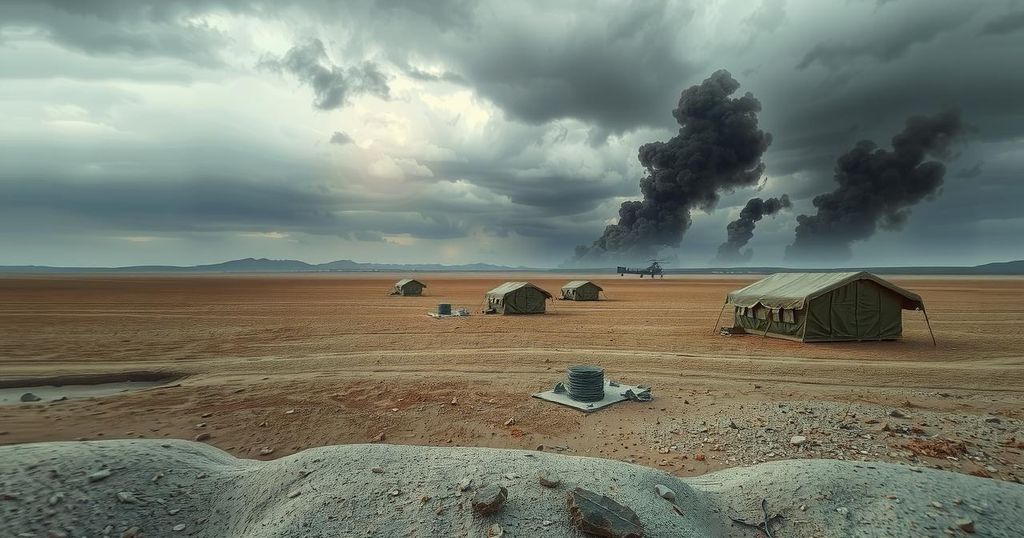Desertion of Cameroonian Soldiers to Ukraine: A Rising Security Concern
The desertion of Cameroonian soldiers to fight in Ukraine is weakening the operational capacity of African militaries. Recent trends indicate increased desertions since Russia’s invasion of Ukraine, accentuated by financial incentives offered by Russian forces. These departures pose challenges for national security amid rising threats from various factions, necessitating urgent reforms in military oversight and personnel management in Cameroon.
The desertion of soldiers from Cameroon to engage in the conflict in Ukraine poses a significant threat to the operational effectiveness of various African militaries and the stability of the nations affected. Cameroon’s Defence Minister Joseph Beti Assomo recently underscored this trend, which has intensified following Russia’s invasion of Ukraine. While some deserters are referred to as ‘foreign volunteers’ fighting for Ukraine, the majority are involved with Russia’s forces.
The absence of official data regarding desertion rates presents a challenging scenario for Cameroon, which faces multiple domestic security threats, including Boko Haram, rebel factions, maritime piracy, and the ongoing Anglophone crisis. The desertion phenomena began in the late 2010s, with many elite soldiers lured by promising opportunities overseas, particularly in Dubai.
Reports from 2018 indicated that desertions involved between 300 and 800 soldiers, and by 2020, media sources noted that 637 soldiers faced dismissal due to such actions. The influx of Cameroonian troops to the Ukraine conflict has been further exacerbated by local recruitment networks that offer attractive salaries.
These salaries, reportedly between XAF 1.2 million ($1,976) and XAF 2 million ($3,294) for specialists, contrast sharply with the significantly lower wages of Cameroonian soldiers. For example, a second-class private earns only XAF 51,880 ($85) monthly, with additional allowances for combat deployment worth XAF 90,000 ($148).
In essence, the disparity in compensation between Russian and Cameroonian soldiers becomes a culling factor, with Russian offers presenting as a ‘golden suffering’ compared to the dwindling salaries in Cameroon. Soldiers have voiced concerns about their increasing workloads and overall perilous circumstances, forcing many to reconsider their commitments to military service.
This wave of desertions highlights a broader trend of brain drain in Cameroon, where medical personnel and educators are also seeking opportunities abroad. Recent statistics indicated substantial migration of Cameroonians, with the International Organization for Migration recording thousands seeking refuge in Canada and the United Kingdom.
As the desertion crisis continues, the Cameroonian military struggles with rising recruitment challenges, as the departures of new recruits diminish operational capabilities. The potential return of these seasoned soldiers poses additional security concerns, as their combat experiences may be turned against national interests.
In response, Defence Minister Assomo has called for stricter regulations concerning military personnel deserting, including the implementation of dismissals and legal action against offenders. The military has been urged to explore loyalty strategies and improve conditions for soldiers to mitigate this trend, while financial disparities also require urgent addressment.
Overall, there is a pressing need for the Cameroonian military to create a conducive environment for soldier retention by enhancing compensation packages and improving conditions for active personnel. By focusing on these areas, Cameroon may better safeguard its military efficacy in the face of its multifaceted security challenges.
In conclusion, the desertion of Cameroonian soldiers to fight in Ukraine reflects deep-rooted issues within the country’s military framework, including dire financial disparities and increased pressures on personnel. The response from Cameroon’s government emphasizes the need for stricter oversight and improved soldier retention strategies as the country grapples with security threats. Addressing compensation, workload concerns, and conditions of service will be crucial in maintaining a robust military capable of responding to ongoing security challenges.
Original Source: www.premiumtimesng.com




Post Comment